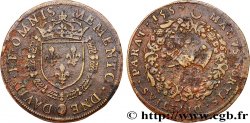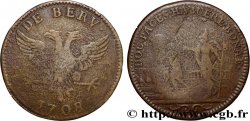MONNAIES 11 (2002)
Starting price : 228.67 €
Estimate : 381.12 €
Realised price : 228.67 €
Number of bids : 1
Maximum bid : 394.08 €
Starting price : 228.67 €
Estimate : 381.12 €
Realised price : 228.67 €
Number of bids : 1
Maximum bid : 394.08 €
Type : Horlogers de Paris
Date: n.d.
Metal : silver
Diameter : 30 mm
Orientation dies : 6 h.
Weight : 8,18 g.
Edge : cannelée
Rarity : R1
Coments on the condition:
Ce jeton présente un belle patine grise avec des reflets verts et bleus au revers. Les reliefs sont nets sauf sur les parties les plus hautes
Catalogue references :
Obverse
Obverse legend : LUD. XV. REX - CHRISTIANISS..
Obverse description : Buste à droite de Louis XV signé fm. [Feuardent n° 322].
Obverse translation : (Louis XV, roi très chrétien).
Reverse
Reverse legend : SOLIS MENDACES - ARGUIT HORAS.
Reverse description : La déesse du Calcul assise à gauche, la main droite sur une horloge, la gauche sur un socle jouxtant un gnomon et un cadran solaire ; à l'exergue en trois lignes : HORLOGERS / DE PARIS / ICC.
Reverse translation : (Elle corrige les heures mensongères du soleil).








 Report a mistake
Report a mistake Print the page
Print the page Share my selection
Share my selection Ask a question
Ask a question Consign / sell
Consign / sell
 Full data
Full data















